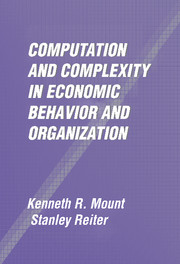
-
Select format
-
- Publisher:
- Cambridge University Press
- Publication date:
- 04 June 2010
- 24 June 2002
- ISBN:
- 9780511754241
- 9780521800563
- 9780521037891
- Dimensions:
- (228 x 152 mm)
- Weight & Pages:
- 0.546kg, 248 Pages
- Dimensions:
- (228 x 152 mm)
- Weight & Pages:
- 0.378kg, 248 Pages
You may already have access via personal or institutional login
Book description
This book presents a model of computing and a measure of computational complexity which are intended to facilitate analysis of computations performed by people, machines, or a mixed system of people and machines. The model is designed to apply directly to models of economic theory, which typically involve continuous variables and smooth functions, without requiring analysis of approximations. The model permits analysis of the feasibility and complexity of the calculations required of economic agents in order for them to arrive at their decisions. The treatment contains applications of the model to game theory and economics, including comparison of the complexities of different solution concepts in certain bargaining games, and the trade-off between communication and computation in an example of an Edgeworth Box economy.
Reviews
‘… the authors present frontier research methods on the important economics of ‘mechanism design …’
Source: Asia Pacific Journal of Management
Contents
Metrics
Altmetric attention score
Full text views
Full text views help Loading metrics...
Loading metrics...
* Views captured on Cambridge Core between #date#. This data will be updated every 24 hours.
Usage data cannot currently be displayed.
Accessibility standard: Unknown
Why this information is here
This section outlines the accessibility features of this content - including support for screen readers, full keyboard navigation and high-contrast display options. This may not be relevant for you.
Accessibility Information
Accessibility compliance for the PDF of this book is currently unknown and may be updated in the future.


